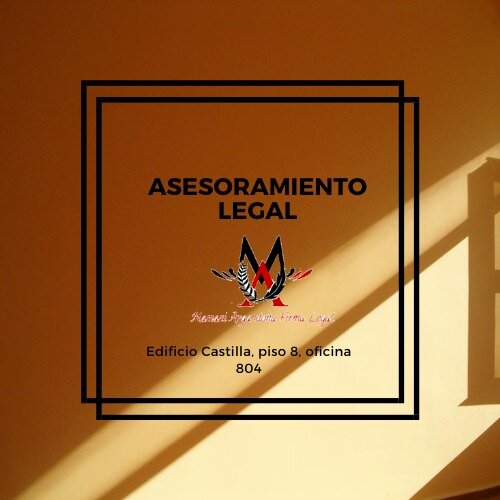Best Energy Regulatory Law Lawyers in La Paz
Share your needs with us, get contacted by law firms.
Free. Takes 2 min.
List of the best lawyers in La Paz, Bolivia
About Energy Regulatory Law in La Paz, Bolivia
Energy Regulatory Law in La Paz, Bolivia is a specialized legal field that governs the production, distribution, and consumption of energy resources, such as electricity, gas, and renewables. This area of law is shaped by both national legislation and local regulations set by Bolivian energy authorities. The primary aim is to ensure that energy services are provided in a manner that is reliable, equitable, and sustainable, balancing the interests of consumers, providers, and the government. Given the country's substantial natural resources, including gas, hydropower, and solar potential, Energy Regulatory Law plays a crucial role in economic development, environmental protection, and the well-being of residents in La Paz.
Why You May Need a Lawyer
People and businesses in La Paz may require legal assistance with Energy Regulatory Law for a variety of reasons. Common situations include resolving disputes with energy providers, navigating complex licensing procedures for energy projects, ensuring compliance with environmental and safety standards, and negotiating contracts in energy supply or infrastructure development. Individuals affected by power outages, billing issues, or regulatory changes may also seek legal advice. For business owners and investors, understanding the intricate framework of energy regulation is essential for forming partnerships, acquiring permits, or expanding operations. A lawyer specializing in this field can offer clarity, advocate on your behalf, and help secure favorable outcomes in administrative or judicial proceedings.
Local Laws Overview
In La Paz, energy regulation is primarily guided by national laws such as the Ley de Electricidad (Electricity Law), the Hydrocarbons Law, and regulations from the Autoridad de Fiscalización de Electricidad y Energía Nuclear (AETN). These laws establish the legal framework for energy generation, transmission, distribution, and commercialization. Local municipalities, including La Paz, often implement additional norms regulating connections, tariffs, and urban development related to energy projects. Environmental considerations are overseen by agencies like the Ministerio de Medio Ambiente y Agua. Key aspects include mandatory licenses for new projects, regulated tariffs for public energy supply, consumer protection rules, and policies encouraging renewable energy. The interplay of local and national regulations can be complex, making legal guidance especially valuable for those engaged in energy-related activities.
Frequently Asked Questions
What is the main regulatory authority for energy matters in Bolivia?
The primary authority is the Autoridad de Fiscalización de Electricidad y Energía Nuclear (AETN), which oversees compliance with national energy laws and regulations, including those enforced in La Paz.
How are electricity tariffs determined in La Paz?
Tariffs are regulated by AETN based on operational costs, investments, and government policies. Regular reviews aim to ensure affordability and service quality for consumers.
Do I need a license to generate electricity for private use?
Small-scale self-generation for personal or business use may not require a full license, but larger projects or those connected to the public grid generally must obtain permits from relevant authorities.
What should I do if I have a dispute with my energy provider?
You can file a formal complaint with the energy provider. If unresolved, you may escalate the matter to AETN or seek legal counsel for representation.
Are there incentives for renewable energy projects in La Paz?
Bolivia has national programs promoting renewable energy, offering tax incentives and expedited processes for approved projects. Local authorities may also provide support.
What environmental regulations apply to energy projects?
All energy projects must comply with Bolivian environmental laws, including impact assessments and permits from the Ministerio de Medio Ambiente y Agua.
Can foreign companies invest in the energy sector?
Yes, foreign investment is permitted, subject to national laws and the requirement to partner with or operate through locally registered entities for certain activities.
How can I ensure my energy contract is fair and enforceable?
Consult a specialist lawyer to review contract terms, verify compliance with energy regulations, and help negotiate favorable conditions.
What penalties exist for non-compliance with energy regulations?
Penalties range from fines and suspension of licenses to criminal liability in severe cases of environmental damage or public safety risks.
How can communities participate in local energy projects?
Community engagement is encouraged through public consultations and, in some cases, the opportunity to form cooperatives or benefit from social responsibility programs tied to energy development.
Additional Resources
Individuals seeking more information or assistance in Energy Regulatory Law in La Paz, Bolivia may consider the following entities:
- Autoridad de Fiscalización de Electricidad y Energía Nuclear (AETN) - Provides regulatory oversight and handles consumer complaints.
- Ministerio de Energías - Develops and implements national energy policies and programs.
- Ministerio de Medio Ambiente y Agua - Oversees environmental compliance in energy projects.
- Local energy utility companies - Offer customer service and information regarding billing, connections, and services.
- Bolivian Bar Associations - Provide directories of qualified energy law attorneys.
- Non-governmental organizations - May offer advocacy and public education on energy rights and regulations.
Next Steps
If you require legal assistance in Energy Regulatory Law in La Paz, start by identifying your specific concern, such as licensing, contracts, disputes, or regulatory compliance. Gather all relevant documents and correspondence. Consider contacting regulatory authorities or consumer protection offices for initial guidance. For tailored legal advice or representation, consult a lawyer or law firm specializing in energy matters. During your consultation, be ready to provide a clear description of your situation and any supporting evidence. Legal professionals can guide you through procedures, negotiate on your behalf, and help achieve resolutions aligned with your objectives and the current legal framework.
Lawzana helps you find the best lawyers and law firms in La Paz through a curated and pre-screened list of qualified legal professionals. Our platform offers rankings and detailed profiles of attorneys and law firms, allowing you to compare based on practice areas, including Energy Regulatory Law, experience, and client feedback.
Each profile includes a description of the firm's areas of practice, client reviews, team members and partners, year of establishment, spoken languages, office locations, contact information, social media presence, and any published articles or resources. Most firms on our platform speak English and are experienced in both local and international legal matters.
Get a quote from top-rated law firms in La Paz, Bolivia — quickly, securely, and without unnecessary hassle.
Disclaimer:
The information provided on this page is for general informational purposes only and does not constitute legal advice. While we strive to ensure the accuracy and relevance of the content, legal information may change over time, and interpretations of the law can vary. You should always consult with a qualified legal professional for advice specific to your situation.
We disclaim all liability for actions taken or not taken based on the content of this page. If you believe any information is incorrect or outdated, please contact us, and we will review and update it where appropriate.








